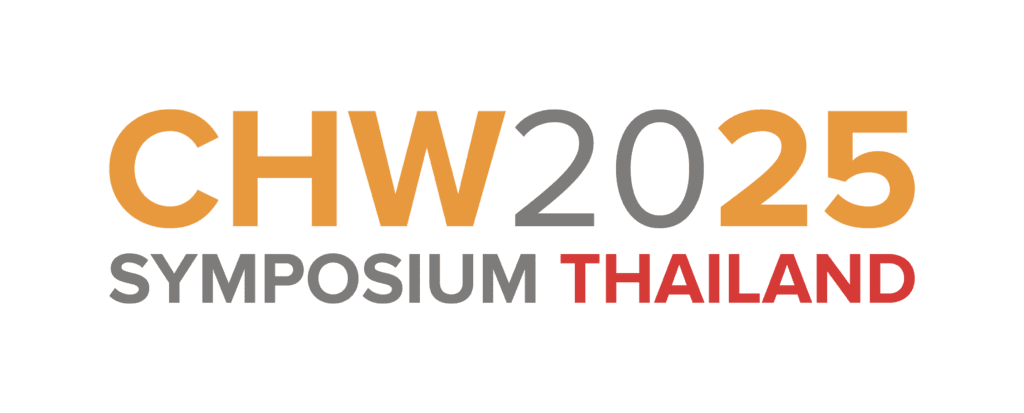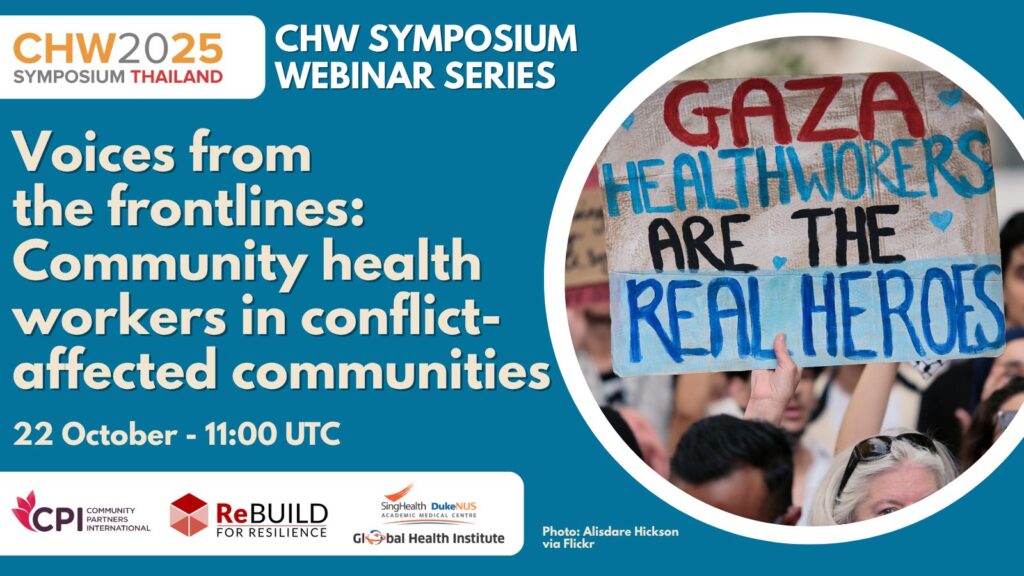Following the successful conclusion on our Gender Webinar, Research Webinar, Sustainable Financing Webinar, and Climate Change Webinar, the CHW Symposium webinar series now turns to its final theme: CHWs in conflict settings. This webinar seeks to spotlight the lived experiences of CHWs working in conflict-affected settings.
Voices from the Frontlines: CHWs in Conflict-Affected Communities
Wednesday 22 October 2025 – 11:00 UTC / 18:00 ICT
Registration for this event is now closed.
Speakers:
- Amuda Baba, Director General at Institut Panafricain de Santé Communautaire et Medecine Tropicale University College, Ituri District, in north east Democratic Republic of the Congo, has extensive experience in the field of community health, including in the impact of conflict on health workers. He will present CHWs in conflict-affected settings. Experiences and challenges of CHWs working in fragile and conflict-affected Ituri Province.
- Malak is a Syrian CHW living and working informally in Lebanon. She will talk about her experiences as a health worker, serving her local refugee community while juggling family responsibilities, all at a time of crisis for both Syria and Lebanon.
- Joanna Khalil, Research Fellow at American University of Beirut, Lebanon, is part of ReBUILD’s research team in Lebanon where she has worked with female Syrian close-to-community health workers in informal settings in Beqaa Valley. She will present Holding the system together: Women health workers and collective care in crisis-hit Lebanon.
- Paolo Malerba and Alessandro Lamberti from EMERGENCY will present Strengthening Primary Care in War-Affected Donetsk: A Community-Based CHW Model which will look at disease burden, access barriers, and practical challenges in that region of Ukraine.
- Mejd Azzeh, Director of 1for3 in Palestine, will present Frontline Care and Community Strength: Health 4 Palestine’s CHWs in Refugee Camps. She will highlight the evolution of the project’s work since 2017, focusing on the vital role of CHWs in UN-run refugee camps across the West Bank, particularly Tulkarm Camp, who have delivered consistent, compassionate care amid displacement, insecurity, and trauma. Their experiences reveal how locally rooted, trauma-informed care can sustain hope, strengthen resilience, and bridge critical gaps in a fractured health system.
Meet our moderator:
Dr. Kyu Kyu Than, Research Director at Burnet Institute, leads the ReBUILD team in Myanmar and has extensive experience in health systems research, with a particular focus on sexual, reproductive and maternal health.
This session will begin with a welcome remark by Lydia DiStefano, Sr. Research and Advocacy Manager from Community Partners International.
Background
Community Health Workers (CHWs) are essential health providers in many of the world’s most fragile and conflict-affected settings. Their presence in communities before, during, and after conflict makes them uniquely positioned to provide continuity of care, deliver lifesaving services, and support recovery.
Yet, the role of CHWs in conflict-affected contexts is often under-recognized and under-supported. Operating in environments of insecurity, displacement, and fractured health systems, CHWs face immense personal and professional challenges, including threats to their safety, limited access to supplies, disrupted supervision structures, and lack of remuneration. Many are also from communities directly affected by violence, adding emotional and psychological burdens to their already demanding roles.
This webinar will spotlight the lived experiences of CHWs working in conflict-affected settings. It will explore the practical, emotional, and ethical dimensions of frontline health work in crisis zones, while also highlighting promising strategies to support, retain, and protect CHWs in such contexts. By elevating their voices and perspectives, the session aims to shape more equitable, resilient, and responsive health systems in fragile settings.
Registration for this event is now closed.
Resources and Materials
- Working Women Support Group is a collective born amid Lebanon’s overlapping crises, to illustrate how solidarity, skill-building, and advocacy can strengthen both personal resilience and local health systems. Through collaboration with local NGOs, these women advanced initiatives in childcare, community cohesion, and advocacy, showing how grassroots empowerment links social support to systemic health resilience.
- Since 2022, EMERGENCY has been working on a community-based primary care network in Kramatorsk raion, Donetsk Oblast (Kramatorsk raion). The project rehabilitates and equips clinics (including prefab units) and trains and deploys CHWs for door-to-door outreach, medication support, and health education. It currently comprises 11 CHWs and 14 clinics serving 14 villages (~10,000 people). Over the past two years, CHWs have delivered more than 9,000 home visits, strengthening access and continuity of care for vulnerable households despite ongoing hostilities and mobility constraints.
Further information
This webinar is especially co-organized by ReBUILD for Resilience. This is part of a global series hosted by Community Partners International, in collaboration with ReBUILD for Resilience, SingHealth Duke-NUS Global Health Institute, and Community Health Impact Coalition, in the lead-up to the 4th International Community Health Workers Symposium, which will take place virtually on 10-14 November 2025. Please visit their websites to learn more about their works and contributions on CHWs and Global Health.

